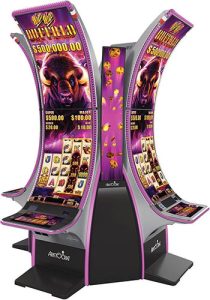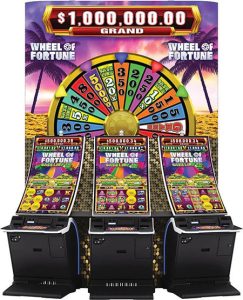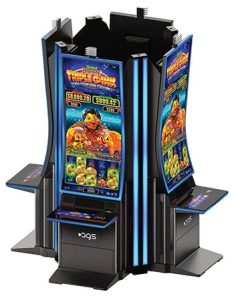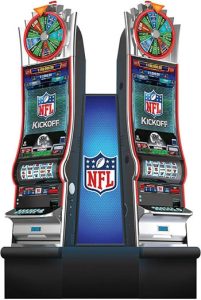PICKING THEMES
Players have shown they take to many proprietary slot themes at least as much as those games with flashy licensed themes
By Frank Legato
 The nature of slot machines underwent a big change in the late 1990s. As multi- line video slots spread from Aristocrat to WMS Gaming and beyond, IGT launched a game in 1996 that would, in essence, create a new genre of slot machine: the themed game.
The nature of slot machines underwent a big change in the late 1990s. As multi- line video slots spread from Aristocrat to WMS Gaming and beyond, IGT launched a game in 1996 that would, in essence, create a new genre of slot machine: the themed game.
That first game was, of course, Wheel of Fortune, a big-money progressive reel-spinner attached to a roulette-like fortune wheel painted in the colors of the game show Wheel of Fortune. Audio blaring the audience cheer from the show sealed the deal, and from then on, slot-makers released slots with special features that went beyond multiplying wild symbols or wheel spins—more often than not falling under a specific theme or brand.
Some of the early ones like the WMS game Reel ’Em In were proprietary brands—that particular game featuring second-screen bonus animation depicting a fishing boat loaded with fishermen and a fisherwoman, all wisecracking with Chicago accents (WMS was based in Chicago) as they dropped their lines trying to hook bonus “fishes” for the players.
But far more dominant at the beginning of the 21st century were slots based on a TV show, movie or music star. Slot manufacturers began competing with each other to nab potentially lucrative themes from popular culture. Bally had its Betty Boop slot, IGT had its Beverly Hillbillies.
 IGT would follow with a barrage of TV-themed slots—Laverne and Shirley, M*A*S*H, The Twilight Zone, I Dream of Jeannie—as well as musical themes like Elvis.
IGT would follow with a barrage of TV-themed slots—Laverne and Shirley, M*A*S*H, The Twilight Zone, I Dream of Jeannie—as well as musical themes like Elvis.
After a few years, the licensed themes were fewer, as slot-makers built up their own proprietary brands. Slots like Lucky Larry’s Lobstermania from IGT, Buffalo from Aristocrat, Rakin’ Bacon from AGS, Cash Machine from Everi and Huff ’N Puff from Light & Wonder became extended game franchises including any number of sequels building on the favorite game basics with new twists and turns.
However, a few high-profile licensed themes also have soared in popularity, prompting continuing game franchises to which players have flocked. Casinos ultimately pay more for these games, typically working out an arrangement to lease the actual machines in exchange for a cut of the profits or a flat ongoing fee to the manufacturer.
 Casinos originally balked at these arrangements, until they realized key benefits: First, the manufacturers handled all maintenance and upkeep of the machines. If the game flopped as a money-earner, the cabinets were such that the manufacturer would be able to turn it into a completely different game by simply replacing the software. It was a good hedge against poor performance.
Casinos originally balked at these arrangements, until they realized key benefits: First, the manufacturers handled all maintenance and upkeep of the machines. If the game flopped as a money-earner, the cabinets were such that the manufacturer would be able to turn it into a completely different game by simply replacing the software. It was a good hedge against poor performance.
But poor performance was rare in this generation of branded slots. More often than not, the games would earn two or three times the house average in profits.
So began game franchises like Monopoly and Willy Wonka from Light & Wonder and The Walking Dead from Aristocrat, which also created a masterful game series with successive games themed to individual seasons of the epic HBO fantasy series Game of Thrones. It recently initiated a new game franchise based on the prequel to the HBO series, House of the Dragon.
IGT, meanwhile, has come out with a few new high-profile game franchises, including Sex and the City, Ghost-busters and most recently, Whitney Houston. But mostly, that supplier continues to milk what has been the most successful themed game series of all time, Wheel of Fortune. In the past year alone, we have seen multiple new iterations of the Wheel of Fortune theme, including a setup featuring a giant bonus wheel in a community-style setting, and even a video poker game that solves a TVstyle puzzle.
But nowadays, the manufacturers are extremely selective when choosing a brand. Where once, you would see dozens of new licensed slots every year, these days, it’s a handful—each continuing game family launching consistent hit games carrying the same theme.
 All can afford to carefully scrutinize possible new licensed themes because their in-house brands are doing so well.
All can afford to carefully scrutinize possible new licensed themes because their in-house brands are doing so well.
Aristocrat adds to its massive Buffalo game family every year. Light & Wonder’s Huff ’N Puff series, first launched in 2019, now includes half a dozen games. The same is true with Rakin’ Bacon from AGS.
Other emerging homegrown themes are Devil’s Lock from Bluberi, K-Pow Pig from Konami, QuickSpin and San Fa from Ainsworth, and Money Party from Novomatic.
That doesn’t mean there will be a dip in licensed offerings. However, leased and licensed games are more balanced with the proprietary brand choices than in the past. For every new Wizard of Oz or King Kong game, Light & Wonder has a new Huff ’N Puff or Blazing 7s title. Aristocrat matched the launch of its NFL-themed game family with a new barrage of Buffalo games. IGT complements its Whitney Houston games with new versions of classic game families like Cleopatra.
In all, the slot-makers have come up with a diverse range of choices for us players. We’ll see consolidation in a few  of the suppliers with recent deals like Merkur’s acquisition of Gaming Arts and the megadeal that will bring the games of IGT and Everi under one roof.
of the suppliers with recent deals like Merkur’s acquisition of Gaming Arts and the megadeal that will bring the games of IGT and Everi under one roof.
The variety of game content will continue after the mergers and acquisitions, because the major slot manufacturers have figured out a formula that offers something for every player—branded game or not.


